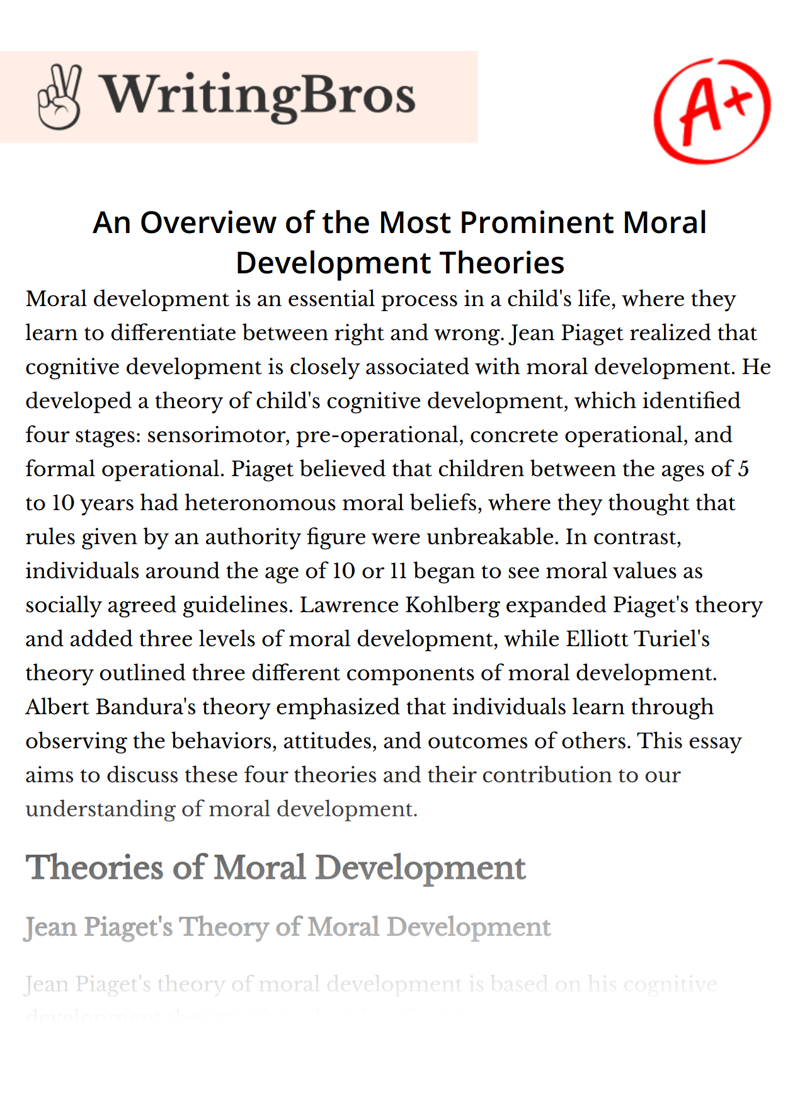An Overview of the Most Prominent Moral Development Theories

Table of contents
Moral development is an essential process in a child's life, where they learn to differentiate between right and wrong. Jean Piaget realized that cognitive development is closely associated with moral development. He developed a theory of child's cognitive development, which identified four stages: sensorimotor, pre-operational, concrete operational, and formal operational. Piaget believed that children between the ages of 5 to 10 years had heteronomous moral beliefs, where they thought that rules given by an authority figure were unbreakable. In contrast, individuals around the age of 10 or 11 began to see moral values as socially agreed guidelines. Lawrence Kohlberg expanded Piaget's theory and added three levels of moral development, while Elliott Turiel's theory outlined three different components of moral development. Albert Bandura's theory emphasized that individuals learn through observing the behaviors, attitudes, and outcomes of others. This essay aims to discuss these four theories and their contribution to our understanding of moral development.
Theories of Moral Development
Jean Piaget's Theory of Moral Development
Jean Piaget's theory of moral development is based on his cognitive development theory, where he identified four stages of cognitive development. According to Piaget, moral development is closely tied to cognitive development. He believed that children between the ages of 5 to 10 years have heteronomous moral beliefs, where they see rules handed down by authority figures as unbreakable. However, around the age of 10 or 11 and continuing through adolescence, individuals typically begin to see moral values as socially agreed upon guidelines, known as autonomous views. The development of morals is completed when an individual understands that their actions can affect them and those around them, positively or negatively.
Lawrence Kohlberg's Theory of Moral Development
Lawrence Kohlberg expanded Piaget's theory and developed a theory of moral development that consists of three levels, with each level having two stages. The first level of Kohlberg's theory is pre-conventional morality, where children nine years and below have their morality shaped by the consequences that adults can impose on them for breaking rules. In stage one, individuals behave well to avoid punishment, while in stage two, individuals begin to understand that there is more than one viewpoint on morality. The second level of Kohlberg's theory is conventional morality, where individuals begin to value moral codes of adult role models. In stage one of level two, individuals behave well for the approval of others, while in stage two, individuals start to develop an understanding of society's rules. The final level is post-conventional morality, which is based on an individual's self-chosen principles. The first stage for level three is for individuals who develop a belief that although a rule or law exists, it may not benefit certain people. The final stage for level three is for the belief that everyone has basic rights and that a person's decisions in life are based on universal moral principles.
Elliot Turiel's Moral Domain Theory
Elliot Turiel's Moral Domain Theory describes three separate components of an individual's moral development: societal, psychological, and moral. According to Turiel, moral knowledge begins at a very young age. The societal component refers to individuals gaining knowledge in regulated actions that were created for a smooth operation of social institutions and groupings. The psychological component is for individuals gaining knowledge in understanding themselves, other individuals, belief systems about individuality and autonomy. The moral component of the moral domain theory is gaining knowledge about how people should treat each other.
Albert Bandura's Theory of Moral Development through Social Learning
Conclusion
In conclusion, moral development is a complex process that is influenced by various factors. The theories discussed in this essay provide insight into how individuals learn right from wrong, and how different factors, such as social learning, societal norms, and cognitive development, contribute to moral development. While each theory has its strengths and weaknesses, they all provide valuable contributions to our understanding of moral development, and together, they help us to better understand the complex process by which individuals develop their moral values and beliefs.
References
- Kohlberg, L. (1981). Essays on moral development: Vol. I. The philosophy of moral development. Harper & Row.
- Piaget, J. (1932). The moral judgment of the child. Free Press.
- Gilligan, C. (1982). In a different voice: Psychological theory and women's development. Harvard University Press.
- Hoffman, M. L. (1982). Development of prosocial motivation: Empathy and guilt. In The development of prosocial behavior (pp. 218-231). Academic Press.
- Nucci, L. P. (2001). Education in the moral domain. Cambridge University Press.
Cite this Essay
To export a reference to this article please select a referencing style below

